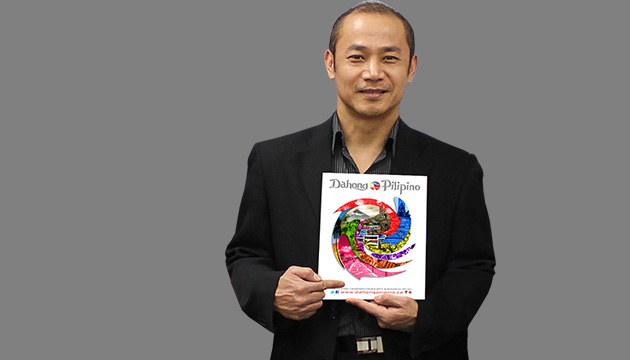Dahong Pilipino is the only Filipino directory of its kind in Canada that has published editions for 25 consecutive years. Its publisher, Leo O. Cunanan Jr., is proud to have brought it up to date by making it digital in line with the trend of today’s publications. With this new technology, advertisers now benefit not only from the colourful display of their ads in the printed directory but also online in the Dahong Pilipino website (www.dahongpilipino.ca).
The ads in the website are automatically linked to Facebook, LinkedIn, and Twitter making them accessible though search engines like Google and Yahoo and disseminating them to a wider audience.
Another new feature of Dahong Pilipino is its link with newspapers in the Philippines, which allows readers to keep track of developments back home on a daily basis through news updates. The website also has a list of community events which is constantly renewed through notices or blogs. Its list of Filipino associations in Canada with contact information has proven to be an effective networking tool for Filipinos all over Canada who need to be connected. And it’s Guide to Resources has been reorganized and reformatted to make it easier and faster to use.
Chronicling Filipino Businesses in B.C.
In 1992, Leonardo “Ding” Cunanan started publishing Dahong Pilipino, an annual directory featuring Filipino businesses in B.C. Now on its 25th year of publication, Dahong Pilipino, based in Vancouver, has followed the rise and fall of many Filipino Canadian businesses in B.C. And Ding, as its founder and editor, has had a ringside view of how these Filipino businesses have progressed over the last 25 years.
According to Ding, in the 1990s, Filipino businesses were mainly focused on food services, health and wellness, automobile sales and services, money remittances, cargo delivery, real estate sales, home repairs, immigration services, beauty and grooming, news and entertainment, travel, legal issues and insurance. They were mainly small-scale with limited capital; some like hairdressing and sewing, insurance and real estate services were home-based.
When the first edition of Dahong Pilipino was published in 1992, the most advertised ventures were the following; ) realtors (38), insurance representatives (23), restaurants (11), automobile dealers and sales representatives (9), travel agencies (9), beauty salons (8), food distributors (7), automobile repair shops (6), insurance brokers (6), music –bands (6), metal products (5), parcels and cargo services (5), music - DJ (4), computer sales and services (4), financial planning services (4), construction development (4), credit and loan (4), sportswear (4), domestic employment service (4), draperies and blinds (3), bakeries and bakeshops (3), driving schools (3), florists (3), home Care (3), optical services (3), video coverage (3) photographers (2), print shops (2), and funeral services (2).
While many of the Filipino businesses and services in Dahong Pilipino’s first edition have failed, many more new ones have opened in various categories. Ding’s review of advertisers from 1992 to 2017 editions revealed that out of 213 ads in 1992, only 40 are still operating after 25 years. Many of the remaining ads are by people engaged in marketing and sales. However, while there were 38 realtors listed in 1992, only 12 of them are in the business today. Out of 23 insurance representatives listed in 1992, only six are still selling insurance. The most remarkable growth among professional business ads is from dentists. While only three were listed in 1992, there are 20 dentists advertising in 2017. This does not include those dentists who preferred to advertise in other media outlets such as Filipino newspapers and magazines. In 1992, there were 11 Filipino groceries and variety stores advertised in Dahong Pilipino; in 2017, only one of them remains in operation. In 1992, 11 Filipino restaurants were listed; in 2017, only three of them are still open. In 1992, nine travel agencies were listed, now only three.
Problems of Filipino businesses
Perhaps because many of the Filipinos in business then were not trained in business marketing and management, many of the early ventures failed. Another reason, according to Ding, was that the Filipino market was not yet big enough at the time. He cites as an example the survival rate of sari-sari stores. “Advertisements in Dahong Pilipino for this category showed that from 1991 to 2006, 20 sari-sari stores had opened and closed in that period alone,” he said.
“When a business starts to incur losses and cash flow problems, it could be due to poor management skills, lack of sound business plan, staffing problem, poor accounting practice, stiff competition, lack of promotion and advertising and poor customer service,” Ding explained. “Some businesses fail when conflicts among partners arise. Pricing competitions in businesses like travel agencies and door-to-door cargo service could also cause entrepreneurs with limited capital to cease operation.”
A new breed of Canadian Filipino Entrepreneurs
Over the years, Filipino businesses have expanded as shown in the latest issue of Dahong Pilipino 2017. Today, in addition to the usual ads for professionals like dentists, doctors, lawyers, insurance agents, immigration consultants and realtors and the regular ads for groceries, restaurants, automobile sales, travel agencies, money remittance and cargo forwarding, there are also ads for information technology support and other services catering not only to Filipinos but to a mainstream clientele.
The new Filipino businesses include acupuncture, arts and graphic designs, business coaching, carpet cleaning, dance studios, driving lessons, electrical contractors, engineering consultants, excavating , fence and gates, floral arrangements, global money transfers, heating, home renovations, house inspections, house painting, junk and rubbish removal, landscaping, laser hair removal, limousine service, martial arts, massage therapy, media production, mortgage brokers, movers, music lessons, photography, plumbing, printing, real estate investments in the Philippines, software -IT management, telecommunication, tattooing, videography, and website development.
“It remains to be seen if these new businesses will do better than the previous ones,” Ding cautioned. “It should be noted that according to the Office of Advocacy of the U.S. Small Business Administration (SBA), about two-thirds of businesses with employees survive at least two years, but only 50 percent make it to the five-year mark and just one-third celebrate their 10-year anniversary. The SBA also added that the rates of companies that go out of business have changed little over the past 20 years.”
“I hope Filipino businesses will not suffer the same fate. It is also difficult to depend only on the Filipino market especially for sales people involved in insurance, financial services, real estate and other products. The more successful ones are those who sell products needed by the mainstream market.”
According to Ding, Filipino entrepreneurs who succeed in business start with a sound business plan, employ professional management practices and have good customer relations. “They understand their products and develop a good sales and marketing strategy. Hiring the right staff and keeping good accounting records help avoid financial problems.”
Leo, Jr. added, ‘We are confident that with the growing number of Filipinos, there is a good prospect for more of them to engage and succeed in business if they plan ahead, know their products and their customers well and have enough capital and good leadership skills.”
{



